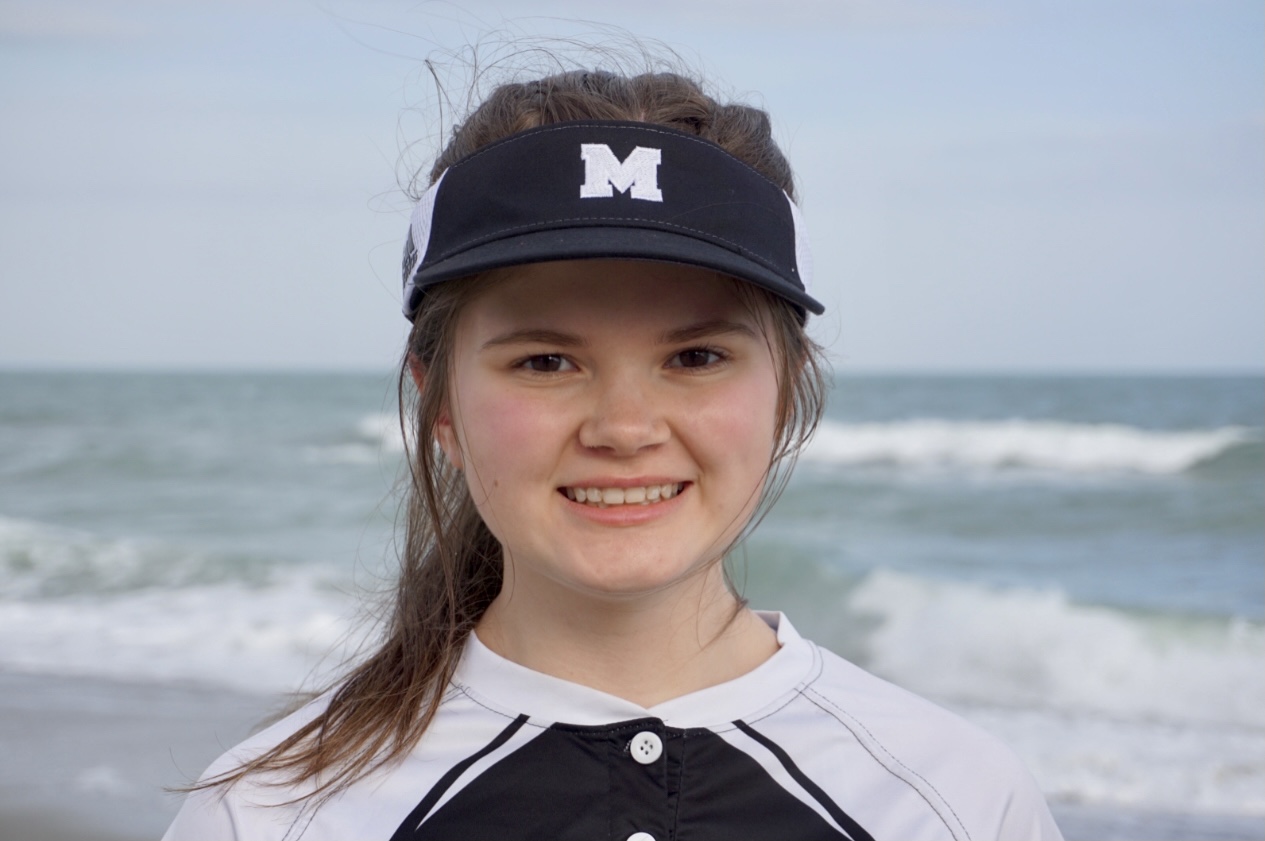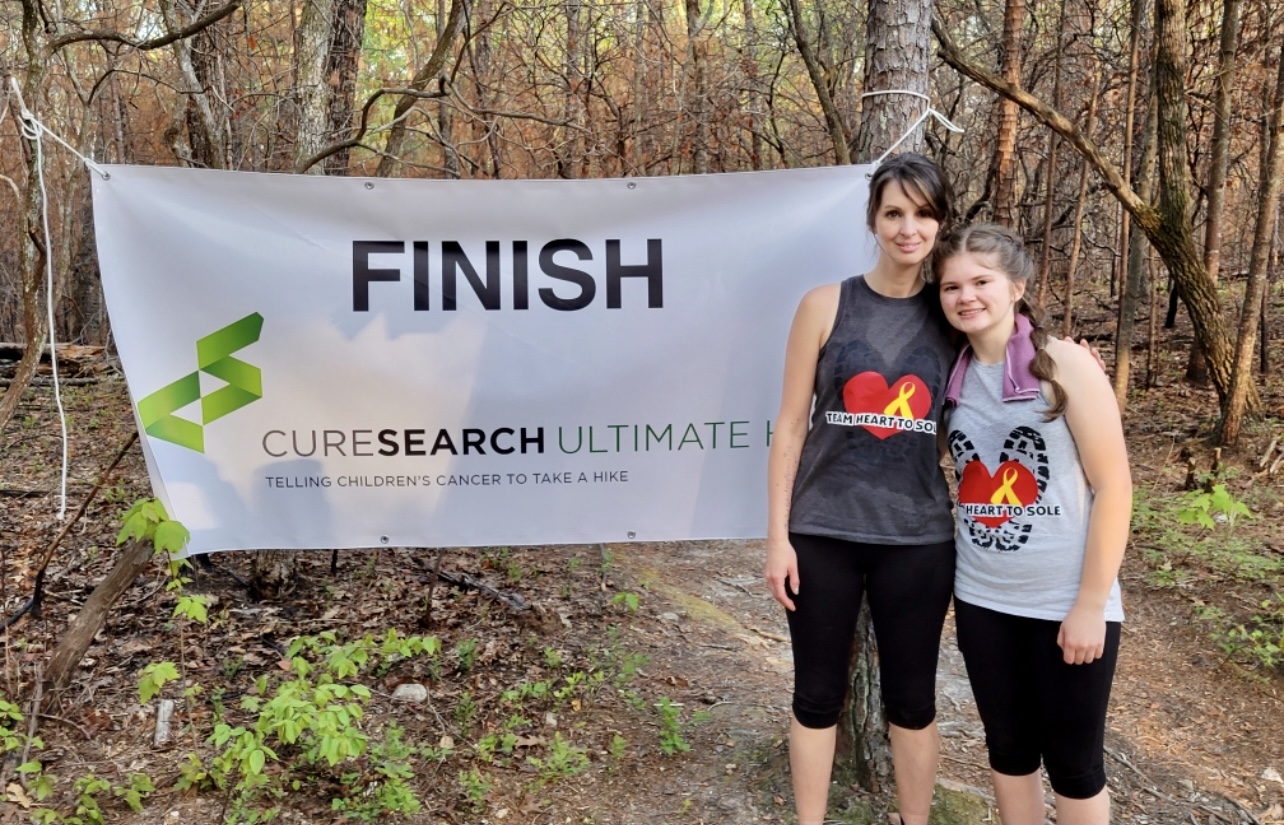
WEST SUNBURY, Pa. (EYT/D9) — Taylor Voloch was having severe headaches. She was nauseous. She was vomiting.
The 7-year-old was at the doctor’s office almost weekly. Her father, Joe, and mother, Angie, were finally told Taylor was experiencing severe migraines.
For a year, Taylor struggled with debilitating symptoms. One day at school, she suddenly couldn’t see was rushed to the hospital for tests.
That’s when the Voloch family received the shocking news.
Growing near Taylor’s brain stem was a tumor bigger than a golf ball. The slow-growing mass of abnormal cells had been getting bigger and bigger, digging deeper and deeper into her cerebellum.
Juvenile Pilocytic Astrocytoma was the clinical term for the tumor. For Angie and Joe, it was unthinkable.
“My husband passed out,” Angie said. “I was … yeah, it was bad.”
Taylor, though, was too young to truly grasp what was going on. She knew she was in the hospital and she knew her closest loved ones were there with worry creasing their faces.
“I could see everyone was sad,” Taylor said. “I was more scared than anything.”
Doctors were amazed Taylor was functioning so well with such a large mass in her brain. The tumor was benign, but very big, and Taylor should have been experiencing more profound symptoms.
“They told is that she shouldn’t even be able to walk at this point, but she was somehow playing basketball and stuff at the time,” Angie said.
They also told the family that the surgery, which was already scheduled for the next morning, came with significant risks.
“They told us not to expect too much because it was in an area of the brain that dealt with balance and coordination,” Angie said. “It was close to the brainstem, but not so close that they couldn’t do surgery. They couldn’t remove all of it because of where it was.”
Doctors prepared the family for a grim and sobering post-surgery prognosis: Taylor may never be able to walk normally again. She’d could be disabled for the rest of her life. She could be confined to a wheelchair.
Taylor’s family prepared for the worst.
They held vigil at the hospital, and at Taylor’s bedside in the ICU, waiting for the swelling to subside and for her to wake up. Only then would doctors and the family know the extent of the damage to her brain.
Doctors told Angie that when Taylor did awaken, she probably wouldn’t be able to speak and that she wouldn’t know what was going on.
When Taylor finally opened her eyes, she set them squarely on her mother.
“Mom,” Taylor said clearly. “I’m hungry. Can I go home?”
Taylor was supposed to be in the ICU for two weeks; She was out in one day. She was supposed to be hospitalized for a month; She was home in a week.
But this was just the first step in a long and winding journey for Taylor, now a sophomore at Moniteau High School and a member of the softball and golf teams for the Warriors.
It’s one that still marches on today.
DEFYING THE ODDS
Taylor made a rapid recovery. She felt good. It didn’t take her long to resume the things she loved, especially sports.
She was a kid again.
No headaches. No nausea. No vomiting or dizziness or vision problems.
Taylor was certain she had beaten the tumor that threatened her life and longterm health.
But in November of 2015 — a year to the day she was diagnosed with her brain tumor — Taylor was back at the hospital again for a routine scan.
It was the worst possible outcome.
The tumor had grown back, this time into a new area of the brain. It was nearly as big and just as life-threatening as before.
The family was shocked.
Pilocytic Astrocytomas account for 25% of all pediatric brain tumors. Regrowth is not common — it only occurs in 19% of cases.
Survival rate is 92%, but falls to 81% upon recurrence. Survival rates also vastly vary depending on the size and location of the tumor.
Taylor, now old enough to know what was going on, felt a swirl of emotions bubbling up inside of her.
Sadness. Despair. Depression. Fear.
But most of all, anger.
“Why was this happening again?” She thought. “Why me?” She cried. “What did I do to deserve this?” she asked. Over and over again.
“I didn’t understand why I had to go through this,” Taylor said.
This time the tumor had developed in an even more delicate location in Taylor’s brain and doctors warned against surgery. Their suggestion was a year-long course of chemotherapy to try to shrink it away.
For 12 months, Taylor slogged her way through chemo treatments with the hope it would work.
It did — to a certain extent. Three months after her chemo concluded, the tumor began growing once again.
At that point, dangerous surgery became the only option.
Again, Angie and Joe were warned to expect the worst.
But Taylor came out of it much like she did after the first surgery. Alert. Talking. Minimal complications.
“She defied the odds,” Angie said. “She has a little left-side issues. But to you or someone else who doesn’t know, you probably wouldn’t even notice it.”
It hasn’t slowed Taylor down.
Not one bit.

“It only affects me when I’m very tired,” Taylor said.
She still enjoys playing sports, softball in particular.
Everything Taylor does, she does to the fullest. She value every second, every minute, every day she has. She jumps into every experience with zest.
“Playing softball gives me a chance to remember that, hey, I got through this. I’m just like any other kid,” Taylor said. “I can do what anyone else can do. It gives me a confidence boost.”
HIGH ‘SCANXIETY’
Every year, Taylor has to undergo an MRI to see if another tumor has grown.
At first, the scans came every three months, but as Taylor, now 15, has gotten older and further removed from her surgeries, they only come once a year.
Usually in February.
It’s not hard for Taylor to anticipate when it is coming. When the Valentine’s Day ads begin popping up, she knows a trip inside an MRI machine is not far behind.
Taylor, though, never knows the exact day of the scan until the night before. That’s a heavily guarded secret that Angie keeps to lessen Taylor’s “scanxiety,” as she calls it, as much as possible.
Over the years, Taylor has handled the yearly trips to the hospital with uncommon grace.
“She’s gotten better,” Angie said. “At first, she was like, ‘Why do I have to keep doing this? Why me?’ Now she’s like, ‘Why not me? Better me than someone else,’ which blows my mind.”
Taylor admits to a high level or worry as she waits for the results of the scan. It’s only natural to fear of hearing those words, “the tumor is back.” It’s only natural to dread of hearing something is amiss.
When she does get the all-clear, a strange feeling overwhelms her, one she has difficulty describing.
“At first it’s weird,” she said. “I’m kind of like in a state of shock. I’m excited, but still nervous for some reason. But after we actually walk out of the hospital, I can take a deep breath.”
HIKING FOR A CURE
Taylor’s life has been almost completely shaped by her experiences with two life-threatening brain tumors.
She wants to go into the medical field as a researcher. Her dream is to one day help discover new and groundbreaking treatments for the tumors that besieged her brain so others won’t have to go through what she experienced.
“I knew when I was little I wanted to do something that helped other people,” she said. “But it definitely hit me when I was in a hospital setting a lot that I wanted to work in the medical field. I saw how much they cared and helped other people.”
Taylor, however, never wanted to be a doctor.
“No — I cannot handle blood,” she said, laughing. “I want to do work behind the scenes.”
That means research. That means diving into the chemistry and devising ways to fight illnesses — just like Pilocytic Astrocytoma.
“I want to pay it forward,” Taylor said. “I want to go into biochemistry and research new cures. I want to work in a children’s hospital. I just want to help in general.”
Taylor already is.

She and Angie recently took part in a 28-mile ultimate hike to raise money for CureSearch, a non-profit organization that funds research that will hopefully one day lead to new and more effective treatments for cancer and other tumors in children.
“My mom and I raised over $5,000 each,” Taylor said. “At the end of the hike, they tell you who you are hiking for and honoring. It’s just a great experience in general.”
Taylor is also being honored.
May is brain tumor awareness month and members of the Moniteau softball team are donning gray ribbons in their hair during games to remember all those afflicted by childhood cancer and tumors.
Children just like Taylor.
“I definitely feel very honored,” she said. “It gives me a sense of joy. I don’t really like a lot of attention, but I really appreciate them backing me up and other people like me in general.”
‘MY HERO’
Every year that Taylor is tumor-free, the risk lessens.
It has allowed Taylor to focus on her passions. Softball. Golf. And soaking up as much knowledge as she can.
“I’m a very big nerd. I love to read,” she said, chuckling. “I’m part of our academic team. I just love to learn new information.”
She will always be affected by her experience. She will always carry it around with her, much like she carries around her softball glove, her golf bag and the books she enjoys reading.
She and her family will always be grateful for how fortunate they were, for how Taylor was able to recover from two surgeries and a year’s worth of chemotherapy with such dignity and determination.
“Most people have a hero that may be older, stronger, wiser,” Angie said. “Mine is a 15-year-old young lady that no doubt will make a difference in this world.”












